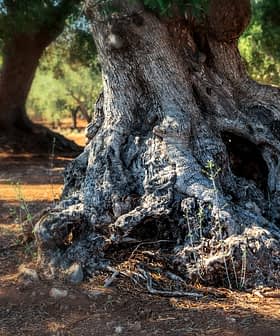Safeguarding Italy's Millenary Trees
Silent witnesses of history, Italy’s millenary olive trees have proven their resilience over time. Local organizations are working to protect them from climate change.
 Olivone (Photo: Associazione Palombella)
Olivone (Photo: Associazione Palombella)  7.6K reads
7.6K readsIn Italy, ancient olive trees, some dating back thousands of years, hold cultural significance and are being preserved by local communities and volunteer associations, despite threats from climate change and land management. Organizations like Millenari di Puglia work to protect these trees, promote environmental education, and add value to olive oil produced from monumental trees through collaborations with other Mediterranean countries like Spain.
In some regions of Italy, it is not uncommon to come across majestic olive trees dating back more than a thousand years.
Their huge diameters, twisted trunks and shapes molded through centuries enchant tourists while assuming a symbolic meaning for local communities as part of collective memories and traditions.
Silent witnesses to history, these giants represent a remarkable example of nature’s resilience, capable of surviving frost, drought, wildfire and lightning, which has been known to split tree trunks in two.
See Also:Sicily’s Monumental Olive Trees Provide Window Into Island’s HistoryYet, in some conditions, they can bear fruit for hundreds of years, yielding precious oil.
Over the years, some of these trees have been named, such as the Queen of Salento in Puglia. For more than 1,400 years, its foliage has shaded the surroundings, and whoever comes to touch its bark, locals say, feels surrounded by a powerful energy.
Then, there is the Olive of the Witch in Tuscany, a 1,700 year-old-tree that stands in an olive grove in Grosseto. The ancient tree owes its name to a legend that says witches used to gather around it to perform their magical rites.
With an estimated age of 4,000 years, the Patriarch of Nature in Luras, Sardinia, is considered one of the oldest olive trees in Italy, contending for primacy with Olivone (literally meaning the big olive tree) in Palombara Sabina, a few kilometers away from Rome.

Patriarch of Nature (Photo: Agenzia Agris Sardegna)
After an accident uprooted part of the trunk in 2009, the inhabitants of the area have made great efforts to preserve and restore the millenary tree.
Taking a photo beneath its majestic canopy has been a local tradition for young couples on their wedding days and is meant to bring peace and prosperity to their futures.
A heritage to be protected and valorized, these trees are now threatened by climate change and land management.
For example, a massive fire in July 2021 damaged the impressive Sa Tanca Manna olive tree in Cuglieri, Sardinia. However, after the exceptional restoration work done by a team of botanists and volunteers, new shoots have sprung from the tree’s trunk.

Sa Tanca Manna (Photo: Montiferru)
“Many people said we were wasting our time trying to revive it,” said Gianluigi Bacchetta, the director of the University of Cagliari’s botanical garden. “Instead, we based our strategy on a series of actions that have proved successful, combining mulching, emergency irrigation, amino acids to stimulate the restoration of root functionality, and protecting the trunk with jute sheets and an upper covering to simulate the crown that was gone.”
Around the country, local volunteer associations assume responsibility for protecting and restoring these trees while spreading the culture of slow tourism and landscape conservation.
Enzo Suma is among the founders of Millenari di Puglia, an association based in Ostuni, in the province of Brindisi, that has worked on environmental education for more than 10 years.
“Puglia is the Italian region with the highest number of monumental olive trees: 350,000, according to the regional list available on the website of the Regione Puglia,” he said. “We work for the tutelage of this unique landscape by organizing excursions and guided tours throughout the year and dissemination activities especially devoted to schools.”
“Thousands of people had by now attended our events: a large part is students, but also families, tourists and citizens,” Suma added.
Intending to add value to the olive oil produced in the region from monumental trees, the association also works with other countries in the Mediterranean, such as Spain.
Millenari di Puglia recently teamed up with a similar organization in Sénia, Catalonia, to organize the Giants of Puglia Award, a competition to draw attention to millenary trees around the region.
Share this article









